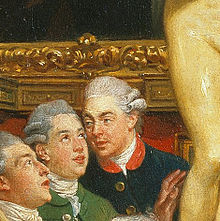Roger Wilbraham (MP)
| Roger Wilbraham | |
|---|---|

Detail from Tribuna of the Uffizi (1772-78) by Johann Zoffany, showing Wilbraham (probably on the left) among a group admiring the statue of the Venus de' Medici
|
|
| Born | 30 December 1743 Nantwich |
| Died | 3 January 1829 London |
| Residence | Stratton Street, Piccadilly |
| Nationality | British |
| Education | Trinity College, Cambridge |
| Political party | Whig |
Roger Wilbraham FRS (1743 – January, 1829) was a British Member of Parliament (MP), bibliophile, antiquary, local historian and a patron of science and the arts. He had an extensive library and he published work on the Cheshire dialect.
Wilbraham was born on 30 December 1743 at Townsend House in Welsh Row in Nantwich. Wilbraham had an elder brother called George and another brother named Thomas. His father and his mother, Mary, sent their son to Trinity College, Cambridge. Wilbraham gained a BA, joined the Inner Temple, gained an MA and became a fellow of the college by 1767.
Wilbraham spent a number of years abroad in France, Spain and Italy. He is believed to be one of the British tourists in Florence who were included in Johann Zoffany's painting of the Tribuna of the Uffizi, a royal commission painted in the 1770s. Roger's younger brother, Thomas, is also thought to be in the painting. The Royal Collection, who still own the painting, identify the Wilbraham brothers as probably being in the group on the right who are admiring the statue of the Venus de' Medici.
Wilbraham was elected fellow of the Royal Society on 28 February 1782. In 1784 he stood unsuccessfully to be the Member of Parliament for Truro in Cornwall representing the interests of Sir Francis Barrett. He and Sir Christopher Hawkins, 1st Baronet received an identical number of votes at an election in the Mitchell constituency but Hawkins was awarded the seat. The Mitchell constituency was a rotten borough and Hawkins was involved in this disreputable business of selling seats in parliament. Two years later Wilbraham was elected for the nearby constituency of Helston, representing his mother's family's interests. From 1790 to 1796 he succeeded his brother George Wilbraham as the Member of Parliament for Bodmin. He made eight speeches in parliament and helped to manage the mistaken impeachment of Warren Hastings following his recall from India. Wilbraham also spoke in defence of Edmund Burke and he was also a strong supporter of Charles James Fox.
...
Wikipedia
